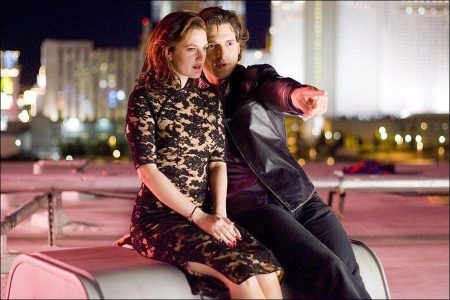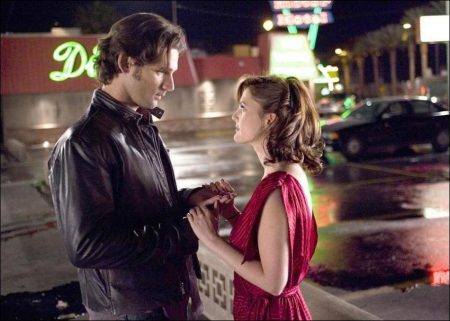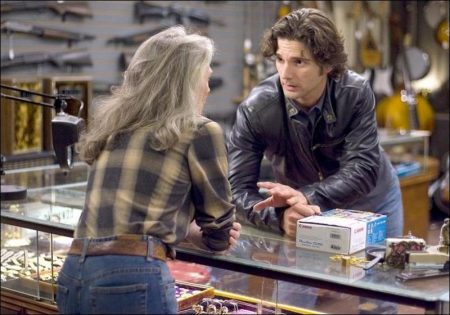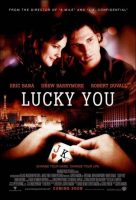Tagline: Change your game. Change your life.
Lucky You movie storyline. In Las Vegas, Huck Cheever is a poker player, brilliant but also prone to let emotion take over. It’s the week of the poker world series, and Huck must come up with the $10,000 entry fee, which he wins, loses, borrows, and loses – and even steals part of from Billie Offer, an earnest young woman who’s new in town and who catches Huck’s eye. By the time the tournament starts, Huck owes everyone. Complicating things is the arrival of Huck’s father, whom Huck detests for having left his mother, a champion player in town to win. Can Huck learn to play poker the way he lives and to live the way he plays poker? Or is his only flush the sound of his life going down the toilet?
Set in the world of high-stakes professional poker, the story focuses on Huck Cheever (Eric Bana), a gifted young poker player confronting his personal demons as he attempts to win a world championship tournament in Las Vegas. In “Lucky You,” director Curtis Hanson brings us a story based in the world of high-stakes Las Vegas poker. Huck Cheever (Eric Bana) is a blaster—a player who goes all out, all the time. But in his personal relationships, Huck plays it tight, expertly avoiding emotional commitments and long-term expectations.
Lucky You is a 2007 American drama film directed by Curtis Hanson, and starring Eric Bana, Drew Barrymore and Robert Duvall. The film was shot on location in Las Vegas. The screenplay was by Hanson and Eric Roth, but the film was partially inspired by George Stevens’ 1970 film The Only Game in Town.
The film was initially set for release on December 16, 2005. This was pushed back to September 8, 2006. By December 2006, the film had been re-scheduled for release on March 16, 2007. In January 2007, the film’s eventual release date was unveiled to be May 4, 2007.
When Huck sets out to win the main event of the 2003 World Series of Poker—and the affections of Billie Offer (Drew Barrymore), a young singer from Bakersfield—there is one significant obstacle in his path: his father, L.C. Cheever (Robert Duvall), the poker legend who abandoned Huck’s mother years ago. As these two rivals progress toward a final showdown at the poker table, Huck learns that to win in the games of life and poker, he must try to play cards the way he has been living his life and live his life the way he has been playing cards.
Shuffle Up and Deal
“Lucky You,” the new romantic drama from writer/director/producer Curtis Hanson, is set in the world of high-stakes poker in Las Vegas in 2003. A longtime poker player himself, Hanson offers, “I wanted to do a relationship story set in the world of poker because I’ve always been fascinated by the fact that the skills one must develop to be a good poker player are almost the exact opposite of the skills needed to be successful in a relationship.
Deceit, or bluffing, which can destroy the trust needed for a successful personal relationship, is a big part of the game. There is also no collaborative spirit; it’s an individual sport. Poker players must be completely self-centered; they can’t have sympathy and win. They can’t worry about whether their opponent can afford a loss. By contrast, warm human relationships are based on caring, empathy, honesty and often putting the other person first. Because of this dichotomy, it seemed poker could be both a metaphor and a mirror for the different relationships in a story.”
Screenwriter Eric Roth actually began writing the original script for “Lucky You” before the spike in poker’s popularity. “I wanted to create something different about gamblers and gambling because I think all great gambling movies are love stories at heart, about winning and losing and finding your way,” he says.
Hanson adds, “We set the story in 2003 because that was the year the world of poker dramatically changed. Three things came together to make that happen. Internet poker was exploding, allowing amateur players from all over the world to hone their card skills online. The hole card camera was introduced that year, which made the game much more popular on television because it allowed the audience at home to see the players’ hole cards and learn about the nuances of betting and bluffing from the top pros. And it was the year an unknown amateur internet player named Chris Moneymaker won the World Series of Poker, making it possible for everyone to say, ‘That could be me.’”
Hanson and Roth collaborated on a final script even as the fast-growing poker craze was bringing a new dimension to the story of a dynamic young poker pro named Huck; his estranged father, legendary poker champion L.C. Cheever; and an aspiring singer named Billie, who comes into Huck’s life and becomes, at once, his muse and his conscience.
Producer Carol Fenelon remarks, “I think Curtis believes the ability to distinguish truth from artifice is an important element of any relationship. In many ways, the world of professional poker in Las Vegas provided the perfect opportunity to explore that idea. Poker can only truly be mastered by those who excel at discerning the difference between honesty and deception. The ability to read people—to understand their ‘tells’ and then act on that knowledge to one’s personal advantage—is perhaps the biggest key to conquering the game.”
Producer Denise Di Novi notes that the poker boom coming when it did was “a nice coincidence because more people are playing and watching poker and understanding the game. Poker really is used as a kind of metaphor for how the characters lead their lives and deal with their relationships, so the more people understand poker, the more meaningful that aspect of the story is to them and the more they can get out of the movie. It’s about the game of life and how you play it to get the most out of it. How much risk do you take and how much do you open up?”
Continue Reading and View the Theatrical Trailer
Lucky You (2007)
Directed by: Curtis Hanson
Starring: Eric Bana, Drew Barrymore, Robert Duvall, Debra Messing, Phyllis Sommerville, Robert Downey Jr., Delaine Yates, Saverio Guerra, Danny Hoch, Jean Smart
Screenplay by: Curtis Hanson, Eric Roth
Production Design by: Clay A. Griffith
Cinematography by: Peter Deming
Film Editing by: William Kerr, Craig Kitson
Costume Design by: Michael Kaplan
Set Decoration by: Robert Greenfield
Art Direction by: Beat Frutiger
Music by: Christopher Young
MPAA Rating: PG-13 for some language and sexual humor.
Distributed by: Warner Bros. Pictures
Release Date: May 4, 2007
Views: 73







